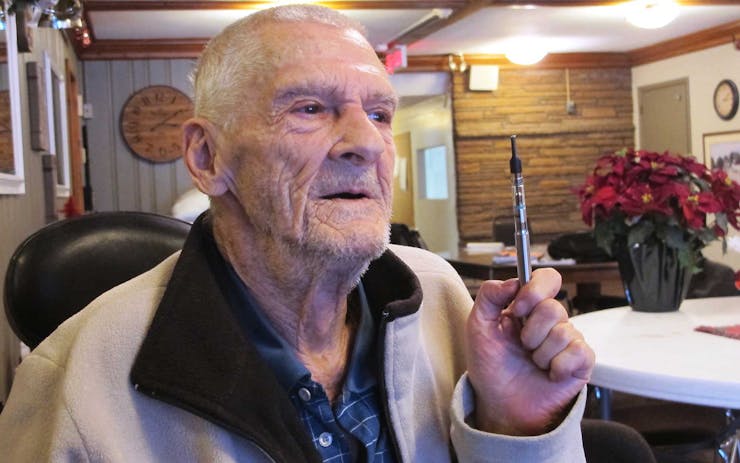John Flickner, the 78-year-old medical cannabis patient who was evicted from his Niagara Falls, NY, apartment last week, was welcomed back by his landlord on Monday. But his hassles are far from over. As a result of the dustup, the program that coordinates his health care has dropped him, leaving him without access to doctors and transportation.
'We are revisiting our policy for this evolving issue. We’ve spoken with Mr. Flickner to let him know he is welcome to return to Niagara Towers.'
Flickner was evicted from Niagara Towers, a federally subsidized housing facility, when his landlord discovered that he used medical cannabis to control his chronic pain. Flickner uses a wheelchair and manages his pain with a cannabis vape pen in order to avoid opiates. He spent much of the past week sleeping in a nearby shelter for homeless people.
After the story—originally reported by the Buffalo News—gained nationwide attention, the corporate owner of Niagara Towers reconsidered its zero-tolerance policy. No company likes being known as the one that tossed an elderly man out on the street in the middle of winter for taking his pain medication.
The eviction was “not a reflection of who we are or our resident service values,” the company, Tennessee-based LHP Capital, said in a statement. “We are rescinding our decision and revisiting our policy for this evolving issue. We’ve spoken with Mr. Flickner to let him know he is welcome to return to Niagara Towers.”
Zero Tolerance Didn’t Work So Well
What a difference a little news coverage can make. The company previously had taken Flickner to Niagara Falls City Court to evict him. During that action, LHP’s attorney argued that the tenant violated the company’s zero-tolerance policy by having “marijuana in his apartment and at that time he did not have medical marijuana.”
The story gained nationwide attention, prompting a Trump administration official to call for a reconsideration of federal policy. Lynne Patton, Region II administrator for the US Department of Housing and Urban Development (HUD), tweeted that “federal law needs to catch up with medicinal marijuana usage & require private landlords to legally permit the same.” HUD policy considers all forms of cannabis to be an illegal Schedule I drug, and the agency forbids its use in federally subsidized housing facilities such as Niagara Towers.

More Problems Coming His Way
Flickner may soon return to Niagara Towers, but now he’s got other problems to deal with.
After news reports detailed his eviction last week, Flickner said the Niagara Falls program that coordinates his medical care suddenly dropped him, leaving him without access to doctors and transportation.
An attorney for the program, Complete Senior Care, said privacy laws prevent him from discussing individual patients. But generally speaking, attorney Jerry Solomon said that because medical marijuana is illegal under federal law, the federally funded program cannot help clients access it without risking its funding.
“Federal guidelines from (Centers for Medicare and Medicaid Services) ban them from prescribing that or allowing access or having anything to do with anyone having medical marijuana,” Solomon said. “To do otherwise would jeopardize being able to service all the other patients that they have.”





